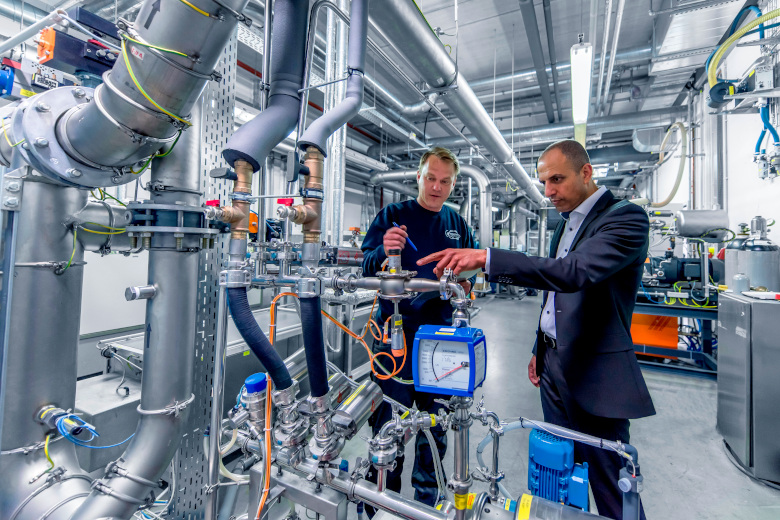
Juri Winkler was recently appointed Sales and Marketing Director of DIOSNA, a LINXIS Group company. He shared with us his views on the current and future direction of the company, the ‘dough experts’, based in Germany, and its latest developments, including a new IoT solution.
Mihu: The IoT solution features a cross-machine recipe editor and integrated account management for transparent process control. Are bakeries already using it? And if so, what feedback are you receiving?
Winkler: We have already started working with some bakers and have just concluded the Beta testing stage, which provided a great opportunity to ask existing and potential customers to join and pool together our expertise. Anyone who is interested in it and its features is warmly welcome to contact me, as development advancements are according to everyone’s needs and input.
Mihu: What can it be currently used for? What goals did the R&D team have for this platform?
Winkler: We are setting it up in different subsequential phases, or packages. With the basic package, a user gains access to the platform, where they can see the machine KPIs as well as process parameters, anything from mixing times to energy consumption and batch information, for example, to give a clear overview of all the operations the equipment is performing. This transparency allows the customer to recognize deviations from the standard values, so that we can be notified whenever an event occurs that requires our attention. The solution is intended as a tool for troubleshooting various issues, not only technical but especially technological, knowledge-related questions, such as mixing times and how they are influenced by different ingredients. This can include how to adapt the process when a new flour delivery arrives with slightly different properties to the one previously used. The IoT platform is the best way to have transparent information exchanges with our customers.
Another package will include a tool for maintenance planning. The IoT platform is able to notify in advance whenever a maintenance procedure is necessary. This means that the customer can plan for the long term to maximize the availability of the machine for production and minimize downtimes.
In combination with the IoT packages, we are also offering different service packages including 24/7 first level support and remote online service.
Mihu: With the Beta version finalized, is the IoT solution now complete? Or is it meant to be under continuous updating and upgrading?
Winkler: There is no limit to further improvements to the IoT platform for the future. This is precisely what makes it so interesting. We are now able to provide the basic package. It is ready to be used now.
Mihu: You mentioned training. Who can enroll for seminars/webinars, and what specializations are available? What is the structure of these training programs?

Winkler: Maintenance teams and operators can enroll for technical training, which can be done on-site. The main focus is on performing first-level, support maintenance and troubleshooting. For technologists and R&D employees, we provide training on technological matters, for example, recipe formulations, or using pre-dough technology in combination with our starter cultures to reach the best possible end product. The program in this case is flexible and can be done either on-site or at our headquarters. The structure of the training sessions is determined on a case-by-case basis; this gives a good example of the customizations that we provide. A training program is always oriented toward the customer’s needs and focuses on maximizing their process efficiency (and can be independent of the equipment we provide). For example, over the past few months, there have been several requests for training sessions for R&D and product management teams from regions where predough is not largely used or even well-known, outside of Europe. We provided them with introductory training on pre-dough technology and the opportunities of working with it and the benefits to their products. Other markets are very familiar with this technology and training sessions are more focused on specific tasks that need to be solved. We take on the challenge! Unique situations we come across are also opportunities for us to advance with our own R&D and develop new solutions, in a partnership approach.
Practice makes progress
Mihu: What strategies, practices and concepts are being revised for the future, and how?
Winkler: We are known in the market as an equipment provider. But, we are much more than that. We are undertaking a major transformation to expand the conversation from equipment to also include solutions and technology – the customer’s process and products, all rounded up with top-level service. When we think of services, we do not only refer to spare parts servicing, but to what we call ‘value-added’ services. As an integral part of customer retention, it also covers the technological side, anything from recipe formulation to raw material analysis. We have invested in equipment and manpower to be able to make analyses, for example of flour, and provide consultancy to our customers based on the results regarding setting the right process parameters for dough preparation. Along with our machines and pre-dough and sourdough technology, testing is also an important component here; we visit our customers with our demo machines to conduct on-site tests and we are also hosting sessions in our technological center in Osnabrück.
Mihu: How does DIOSNA work on a project to provide consultancy regarding process optimization?
Winkler: Many things can be done from the beginning of a project that will significantly influence its later stages. A universal problem, for example, is the acute labor shortage in the industry; it’s not just about finding the right people with the right expertise, it is about finding any people willing to join the industry. This scenario brings with it two major tasks: securing the know-how within the process and the equipment, and advancing the degree of automatization.
We have learned that automatization does not always imply big investments, despite what many bakeries might fear. It can also be incorporated into existing equipment, such as in the case of RFID control systems. Entry-level automatization can help streamline manual operations, while at the end level, operator intervention is not needed at all. Incorporating robotics and self-driving devices are currently part of our major R&D projects. This enables customers with existing equipment to invest in automatization without having to replace the entire line.
Mihu: What concept and practice-related changes can bakers expect going forward, starting from these new goals?
Winkler: Our aim is that customers see us as a partner in their new product development, going beyond being an equipment provider. We are focusing on understanding their processes, keeping in mind the end product and consumer. With quality being an integral part of the customer’s product, we want to ensure that they can make a good product. We can then look at the process and the ways of optimizing it, which can always be found: reusing by-products and minimizing waste, for example, will also count towards the bakery’s sustainability efforts. Only after this analysis, we can start talking about the equipment itself.
Integrated solutions
Mihu: How does DIOSNA develop customized solutions?
Winkler: A custom-made solution needs to match the bakery’s unique needs with a direct link to the end product. It also indicates a certain level of flexibility and automatization in the equipment that we provide in each case. At DIOSNA, we have a portfolio of approved principles and products; the right combination between them represents a custom solution that we develop. One case can be that of customers who are looking to expand existing plants and want to include the latest available technology while doing so. Trending products imply long dough resting times, for example. Solutions catering to them can be further customized by deploying self-driving devices for product handling in the factory.
Mihu: Looking at the technology itself, what are some of the latest equipment upgrades and what are DIOSNA’s unique offerings?
Winkler: The most important is the hygienic design of the Wendel Mixer. The revised design has an open structure with access to the body of the machine, to easily allow the highest possible level of sanitation. The staff can clean the Wendel Mixer in a very short time and even while using low-pressure water, without having to disassemble the machine. The design itself is very lean in order to minimize the surfaces that need cleaning.
“Pre-dough is essential to a wide range of applications.”
Looking at the entire process, DIOSNA stands out by providing pre-dough solutions, which greatly contribute to the overall efficiency of the complete line. Pre-dough is essential to a wide range of applications. Here, we not only provide the pre-dough equipment, but also the biotechnology – the starter cultures in the DIOStart range, which help achieve different effects. Just to give an example, they can help modify the taste, while also extending the product’s shelf life. Pre-dough also helps to optimize the mixing process. We offer solutions to combine the two. Moreover, another aspect of working with pre-dough is reusing leftover dough, which is gaining more and more interest and is providing answers to both costs and sustainability concerns.
Mihu: How are the DIOStart cultures developed and how should they be used with the pre-dough and sourdough systems? Can you give us the benefits of this range?
Winkler: They are based on biological strains that we have developed. Some of them have decades-long history, and are multiplied to create new DIOStart cultures. DIOStart can be supplied on a subscription-based program. The starter cultures were developed to answer various customer challenges, such as salt or sugar reduction, lowering the amount of yeast used, or replacing the functionality of improvers for the sought-after 100% clean label products. Digestibility is also a considered aspect. We can easily combine DIOStarters with the equipment we provide, since the technology was built with settings based on the starters.
Mihu: What are advances towards sustainability at DIOSNA? How can they help optimize production?
Winkler: Our fully-automated systems liquify leftover dough, or even baked products that reenter the production cycle in a controlled way. This also has the advantage of bringing the product’s aroma and flavors into the mix. Alternatively, thanks to using the liquified dough/bread, the water ratio in the product can be increased even more – because part of the water is already bound in the liquified mix giving great results regarding the freshness of the end product. With the current prices of flour, it helps save on ingredient use.
Read the full interview in Baking+Biscuit International, issue 5 – 2022.
Photo credit: DIOSNA


